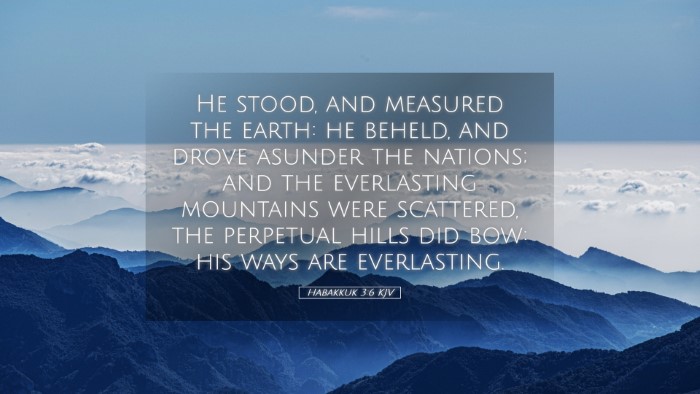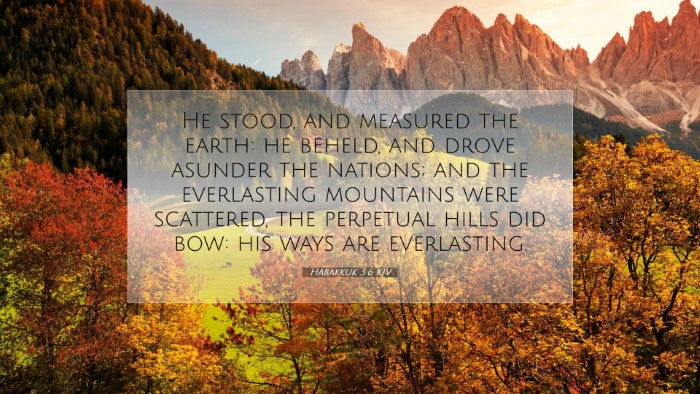Old Testament
Genesis Exodus Leviticus Numbers Deuteronomy Joshua Judges Ruth 1 Samuel 2 Samuel 1 Kings 2 Kings 1 Chronicles 2 Chronicles Ezra Nehemiah Esther Job Psalms Proverbs Ecclesiastes Song of Solomon Isaiah Jeremiah Lamentations Ezekiel Daniel Hosea Joel Amos Obadiah Jonah Micah Nahum Habakkuk Zephaniah Haggai Zechariah MalachiHabakkuk 3:6
Habakkuk 3:6 KJV
He stood, and measured the earth: he beheld, and drove asunder the nations; and the everlasting mountains were scattered, the perpetual hills did bow: his ways are everlasting.
Habakkuk 3:6 Bible Commentary
Commentary on Habakkuk 3:6
Habakkuk 3:6 states: "He stood, and measured the earth: he beheld, and drove asunder the nations; and the everlasting mountains were scattered, the perpetual hills did bow: his ways are everlasting." This profound verse encapsulates the majesty and sovereignty of God over the earth and its nations. Below is a summary of insights drawn from renowned public domain commentaries, focusing on its theological, historical, and moral implications.
Contextual Analysis
Habakkuk's prophecy unfolds in a time of distress for the people of Judah, facing impending invasion and suffering. This third chapter shifts from complaint to a majestic prayer that acknowledges God’s ultimate authority and justice.
The Sovereign Authority of God
According to Matthew Henry, this verse emphasizes God's omnipotence as He "stood" and "measured the earth". The act of measuring signifies His control and authority over creation. The imagery is striking: as God surveys the nations, He does not merely observe but enacts His will upon them. This underscores the theme of divine sovereignty throughout the book of Habakkuk.
The Rebellion of Nations
Albert Barnes points out the significance of the phrase “drove asunder the nations.” This indicates that God has the power to scatter and judge nations that rebel against Him. The reference to “everlasting mountains” and “perpetual hills” illustrates that even the most formidable elements of creation are subservient to His will. It serves as a reminder to the nations that their power is temporary in the face of eternal divine authority.
Theological Implications
The verse invites profound theological reflection on the nature of God’s actions in history. Adam Clarke connects God’s measuring of the earth to His covenant relationship with His people, suggesting that God's judgments are based on justice and righteousness. This passage can be a source of comfort to believers, assuring them that while evil may seem to thrive temporarily, God remains in control, and His judgments will ultimately prevail.
Historical Context
Understanding the historical backdrop of Habakkuk is critical for proper interpretation. The prophet writes during a time of moral and political decay in Judah shortly before the Babylonian exile. Matthew Henry emphasizes that Habakkuk is witnessing the power of Babylon rise unjustly, yet he is reminded through this passage of God’s ultimate authority over all nations, past, present, and future.
Application for God’s People
This prophetic declaration serves as reassurance for the faithful amidst overwhelming adversity. Albert Barnes emphasizes that believers must place their trust in God’s righteousness. As God brings judgment, His people can find solace in the certainty of His plans. This passage encourages vigilance and piety as the faithful await God's deliverance.
Moral and Ethical Reflections
The implications of Habakkuk 3:6 extend into the ethical behavior of believers. As God measures the earth and examines individuals and nations, it calls into question how nations operate within their power. Adam Clarke posits that this ‘measuring’ evokes the need for nations to reflect upon their conduct and align themselves with God’s principles. There is an inherent call for justice, mercy, and accountability.
The Call to Remain Faithful
This verse culminates in a rallying cry for believers to remain faithful and committed to God's righteousness. The eternal nature of God’s ways reminds us that human actions, particularly those that stray from divine commands, are temporary. Matthew Henry encourages believers to stand firm in their faith, trusting that God’s justice will ultimately prevail even if it isn’t immediately evident.
Conclusion
In summary, Habakkuk 3:6 resonates with powerful themes of divine sovereignty, judgment, and moral righteousness. As explored through the insights of Matthew Henry, Albert Barnes, and Adam Clarke, it provides profound comfort and conviction for the people of God. The verse not only serves as a reminder of God’s ultimate authority over the earth but also as a moral imperative for justice and fidelity in the face of adversity. It invites pastors, students, theologians, and scholars to reflect deeply on their roles in proclaiming God’s truth and justice within their communities.


